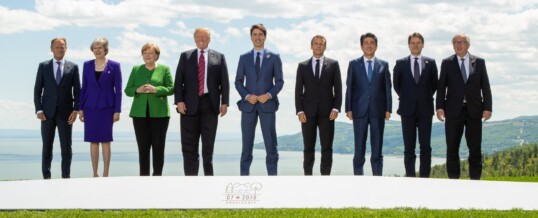
McLeod Group Blog, June 15, 2018
As expected, Donald Trump played the role of the skunk at the G7 picnic in Charlevoix, in keeping with the pattern he has established since becoming US president. Once the media frisson of excitement has passed, what will there be to show for the major investment by Canada in organizing and hosting the 2018 G7 summit? Although the meeting did not lead to major achievements on trade and security, progress was made on gender equality, climate change and the protection of oceans.
There is no question that Canada worked hard to prepare for and host the G7 heads of government meeting. The agenda was very ambitious, but all the subjects needed G7 countries’ attention and action. The items included:
- investing in growth that works for everyone
- preparing for jobs of the future
- advancing gender equality and women’s empowerment
- working together on climate change, oceans and clean energy
- building a more peaceful and secure world.
Early signals during the lead-up to the meeting were reasonably encouraging in terms of movement toward agreement on what had to be done. Among the preparatory actions taken by Canada were the establishment of a Gender Equality Advisory Council to help Prime Minister Justin Trudeau with the discussion topics.
As well, Canada hosted a joint meeting of development and finance ministers, with some central bank heads thrown in for good measure, to discuss innovative financing for development, building economic resilience against extreme weather events, and women’s economic empowerment. The government also organized a meeting of environment ministers in the lead-up to the leaders’ session, addressing the climate change, oceans and energy agenda.
What happens next? The Charlevoix communiqué has something for almost everyone, and even contains several paragraphs setting out the American position on energy and sustainable economic growth (not that this portion of the document has any meaning now that Trump has disowned it). The language in many places is typical of documents written by committees – “endorse”, “support”, “affirm”, “resolved” and so on – which doesn’t constitute firm commitments in any case.
It is worth noting that the leaders acknowledged the risks posed by rising debt levels in low-income countries, as well as the importance of increased resource mobilization to achieve the Sustainable Development Goals and eliminate poverty.
But overall there is no sense that there is going to be more and different action on the large menu in the declaration. One wonders what the 12 “outreach countries”, including those representing the African Union (Rwanda), the G20 (Argentina) and ocean states (Marshall Islands) invited to the second day of the discussions, on oceans, made of the outcome of the G7 leaders’ closed-door session.
The Charlevoix Communiqué contains important language for Canada’s “feminist” development policies, including economic participation, access to education, and ending violence against girls and women. As well, the summit generated $3.8 billion (yes, billion) in commitments for an initiative to improve girls’ education, with particular emphasis on women and girls in conflict and crisis situations. This was much more than the $1.3 billion advocated by a consortium of Canadian NGOs. However, Canada’s contribution will be only $400 million over three years.
Implementing programs to realize the objectives of this fund will not be easy. As we have said before, it is essential that women and women’s organizations from the Global South play lead roles in setting priorities and allocating money. It will be hard to persuade the countries that didn’t sign up, namely Italy and the US, to join, and to encourage France, which had earlier contributed €200 million (about Cdn$300 million) to another global education initiative, to align its commitment with the Charlevoix “fund”, and then to monitor implementation to ensure the delivery of results.
From a development cooperation perspective, there was important content in the discussions, especially with regard to gender equality and the role of women. Canada deserves credit for its efforts in this regard.
Underlying the G7 meeting are two issues of concern: the American protectionist attack on an international rules-based trading system, and the risk to democratic processes and principles from populist and nativist politicians. The principles of multilateralism, inclusivity, fairness and transparency are being challenged and G6 countries must engage and counter these threats.
As for the future of the G7, given the US’s unpredictable international behaviour (to put it politely), the G6 should to move ahead with its agenda. It should also keep the door open for the US to sign up, which is entirely possible.
Now is there enough momentum for France, as the host in 2019, to build on and carry these efforts forward?
